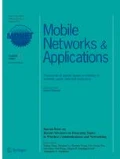Abstract
The importance of uplink resource allocation in ensuring the Quality of Service (QoS) of guaranteed bit rate (GBR) bearers has led to the development of numerous resource allocation schemes. The criteria used in the development of such schemes include maximizing system throughput or fairness and the ability to take transmission power or user priority into account. After accepting a GBR bearer, the eNodeB (eNB) must allocate sufficient resource blocks (RBs) to guarantee the requested QoS. In order to achieve high utilization of radio resource, eNB also must allocate remaining RBs to non-GBR bearers. The QoS is generally specified by the data rate (throughput) or packet delay; however, the 3rd Generation Partnership Project (3GPP) has not specified the means by which data rates for a GBR bearer are to be measured. In this paper, we define the measurement of data rates based on the exponentially weighted moving average (EWMA), thereby enabling the eNB to perform scheduling tasks with greater accuracy. We also present an AAG-2 (Allocate As Granted-version 2) scheme capable of supporting the QoS for GBR bearers, while enabling the efficient allocation of RBs to non-GBR bearers. The existence of parties seeking superior levels of service makes it necessary for telecommunications operators to provide options with regard to QoS. This study proposes a revision of the AAG-2 scheme referred to as AAG-D to accommodate such demands. Simulation results demonstrate the efficacy of the new scheme in achieving goals related to throughput and average packet delay.













Similar content being viewed by others
References
Ruiz de Temino L, Berardinelli G, Frattasi S, Mogensen P (2008) “Channel-aware scheduling algorithms for SC-FDMA in LTE uplink,” in IEEE 19th International Symposium on Personal, Indoor and Mobile Radio Communications, PIMRC
Liu F, She X, Chen L, Otsuka H (2010) “Improved Recursive Maximum Expansion Scheduling Algorithms for Uplink Single Carrier FDMA System,” in IEEE 71st Vehicular Technology Conference (VTC 2010-Spring)
Noh J-H, Oh S-J (2009) “Distributed SC-FDMA Resource Allocation Algorithm Based on the Hungarian Method,” in IEEE 70th Vehicular Technology Conference Fall (VTC 2009-Fall
Nwamadi O, Zhu X, Nandi A (2008) “Dynamic subcarrier allocation for single carrier - FDMA systems,” in 16th European Signal Processing Conference
Delgado O, Jaumard B (2010) “Scheduling and resource allocation for multiclass services in LTE uplink systems,” in IEEE 6th International Conference on Wireless and Mobile Computing, Networking and Communications (WiMob), pp 355–360
Iosif O, Banica I. (2011) “LTE uplink analysis using two packet scheduling models,” in 19th Telecommunications Forum (TELFOR), pp 394–397
Lee S-B, Pefkianakis I, Meyerson A, Xu S, Lu S (2009) “Proportional Fair Frequency-Domain Packet Scheduling for 3GPP LTE Uplink,” in IEEE INFOCOM, pp 2611–2615
Calabrese FD, Michaelsen PH, Rosa C, Anas M, Castellanos CU, Villa DL et al (2008) “Search-Tree Based Uplink Channel Aware Packet Scheduling for UTRAN LTE,” in IEEE Vehicular Technology Conference, VTC Spring, pp 1949–1953
Safa H, El-Hajj W, Tohme K (2013) “A QoS-Aware Uplink Scheduling Paradigm for LTE Networks,” in IEEE 27th International Conference on Advanced Information Networking and Applications, AINA, pp 1097–1104
3GPP, “TS 23.401 v. 13.2.0,” 2015
3GPP, “TS 36.300 v. 12.4.0,” 2015
Astudillo CA, Freitag Borin J, Da Fonseca NLS (2013) “LTE time-domain uplink scheduler for QoS provisioning,” in IEEE Global Communications Conference (GLOBECOM), pp 1458–1463
Triantafyllopoulou D, Kollias K, Moessner K (2015) QoS and energy efficient resource allocation in uplink SC-FDMA systems. IEEE Trans Wirel Commun 14:3033–3045
Ruby R, Leung VCM, Michelson DG (2015) Uplink scheduler for SC-FDMA-based heterogeneous traffic networks with QoS assurance and guaranteed resource utilization. IEEE Trans Veh Technol 64:4780–4796
Kuo F-C, Wang H-C, Tseng C-C, Ting K-C, Liu P-E (2012) “Call admission control based resource allocation scheme for LTE uplink,” in 15th International Symposium on Wireless Personal Multimedia Communications (WPMC), pp 554–558
Kuo F-C, Wang H-C, Ting K-C, Tseng C-C, Liu P-E (2012) “Robust LTE uplink scheduling based on call admission control,” in International Conference on ICT Convergence (ICTC), pp 548–552
3GPP, “TR 25.892 v. 2.0.0,” 2004
3GPP, “TS 36.211 v. 12.5.0,” 2015
3GPP, “TS 36.321 v.12.6.0,” 2014
Pahalawatta PV, Pappas TN, Berry R, Katsaggelos AK (2007) “Content-Aware Resource Allocation for Scalable Video Transmission to Multiple Users Over a Wireless Network,” in IEEE International Conference on Acoustics, Speech and Signal Processing, ICASSP, pp 853–856
Liebl G, Kalman M, Girod B (2005) “Deadline-aware scheduling for wireless video streaming,” in IEEE International Conference on Multimedia and Expo, ICME
Andrews M (2000) “Probabilistic end-to-end delay bounds for earliest deadline first scheduling,” in 19th IEEE INFOCOM, Joint Conference of the IEEE Computer and Communications Societies, pp 603-612
Lou C, Qiu L (2011) “QoS-Aware Scheduling and Resource Allocation for Video Streams in e-MBMS Towards LTE-A System,” in IEEE Vehicular Technology Conference (VTC Fall)
Zhang Z-L, Kurose J, Salehi JD, Towsley D (1997) Smoothing, statistical multiplexing, and call admission control for stored video. IEEE J Sel Areas Commun 15:1148–1166
Acknowledgments
This paper is supported by Ministry of Science and Technology of Taiwan under grant no. 104-2221-E-197-007, 104-2221-E-197-009, 104-2221-E-197-016. The authors would like to also thank Hua-Chun Kao and Zheng-Xian Yang, who helped the simulation work.
Author information
Authors and Affiliations
Corresponding author
Rights and permissions
About this article
Cite this article
Kuo, FC., Ting, KC., Wang, HC. et al. Differentiating and Scheduling LTE Uplink Traffic Based on Exponentially Weighted Moving Average of Data Rate. Mobile Netw Appl 22, 113–124 (2017). https://doi.org/10.1007/s11036-016-0693-9
Published:
Issue Date:
DOI: https://doi.org/10.1007/s11036-016-0693-9




